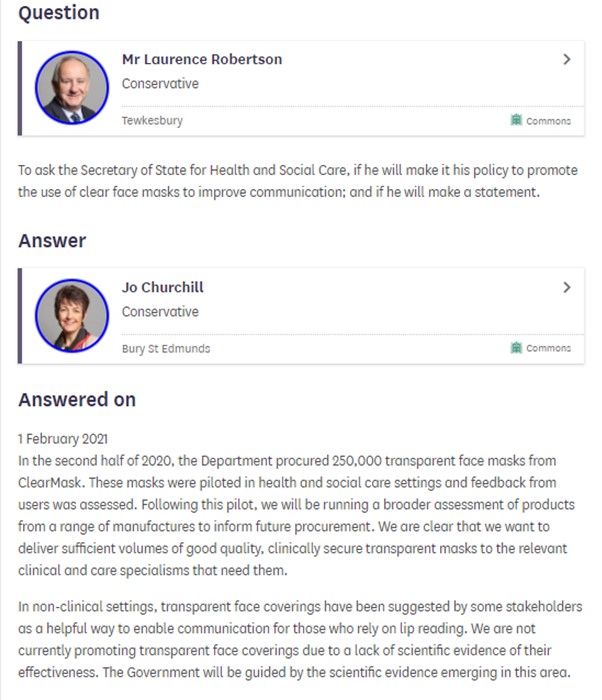Power to make a difference
We want to see government stepping up with even greater support for clear masks to help a range of people communicate and connect in our communities.
By Lucy Adam, Campaigns Lead at Barnwood Trust
Recent support for the Let’s Be Clear campaign from MP Lawrence Robertson led to a question being tabled in Parliament about the use of clear face masks. We were really pleased to see the topic gain this kind of traction – being recognised at such a high level… But, I want to write here about what’s troubling me about the response in Parliament.
Firstly, here’s the question presented by Laurence and the response by Jo Churchill, who is the Parliamentary Under Secretary of State (Minister for Prevention, Public Health and Primary Care):

What’s clear to me at the moment, is that there is obviously a need for strict policies for PPE in clinical settings, and of course for any clear masks that are used to be of a certain medical grade. But crucially, what seems to be overlooked, is that clear masks are important in many, many other settings for the many people who benefit from them, and in these settings medical grade doesn’t matter, as it doesn’t with non-clear masks.
In relation to face masks in general, the Government website states:
In the context of the coronavirus (COVID-19) outbreak, a face covering is something which safely covers the nose and mouth. You can buy reusable or single-use face coverings. You may also use a scarf, bandana, religious garment or hand-made cloth covering but these must securely fit round the side of the face.
The above information from the gov.uk website is what makes the response that Tewkesbury MP Laurence Robertson received even more disappointing.
Firstly, while it’s not the aim of Let’s Be Clear to influence clear face mask use in clinical settings, it is really great news that the Government are continuing with the assessment and procurement of these to support their usage within the NHS… I am hopeful that lots of people will benefit from this.
It is also positive to read that the Government realise that transparent face coverings can be helpful to enable communication. Sadly, it is more disappointing that they know this but have chosen not to promote their use in non-clinical settings. The information from the Government website does not talk about the need for scientific evidence for bandanas or scarfs, or indeed face masks, so I am not sure why this is the case for clear masks.
Clear face masks can make a huge difference to people who are deaf or hard of hearing, people with a learning disability, a speech difficulty, autism, dementia, or English as a second language. Clear masks can help us all feel more connected to those around us.
Vicci Livingstone-Thompson, CEO of Inclusion Gloucestershire and Let’s Be Clear campaign partner, said:
‘It is frustrating when people in positions of power, the vast majority of whom are neurotypical and non-disabled, make decisions based on their priorities and needs rather than those of the people that they represent. Clear face masks can make a huge difference to people’s communication, confidence and ability to get on with daily life in a pandemic, and supporting this needs to be a priority.’
Quite simply, the response from Government is not good enough. More investment and more time need to be given to clear face masks – promoting the benefits they bring to many, and investing in the manufacturing of the masks to make them more widely available.
The Let’s Be Clear campaign will continue to push for the investment in and promotion of the use of clear face masks, and also support all of the other organisations we know are doing the same thing and hopefully we will continue to see progress being made.
For a range of ways to do your bit in raising awareness about this issue and to help more people communicate and connect in your community, visit the resources page on the site.

